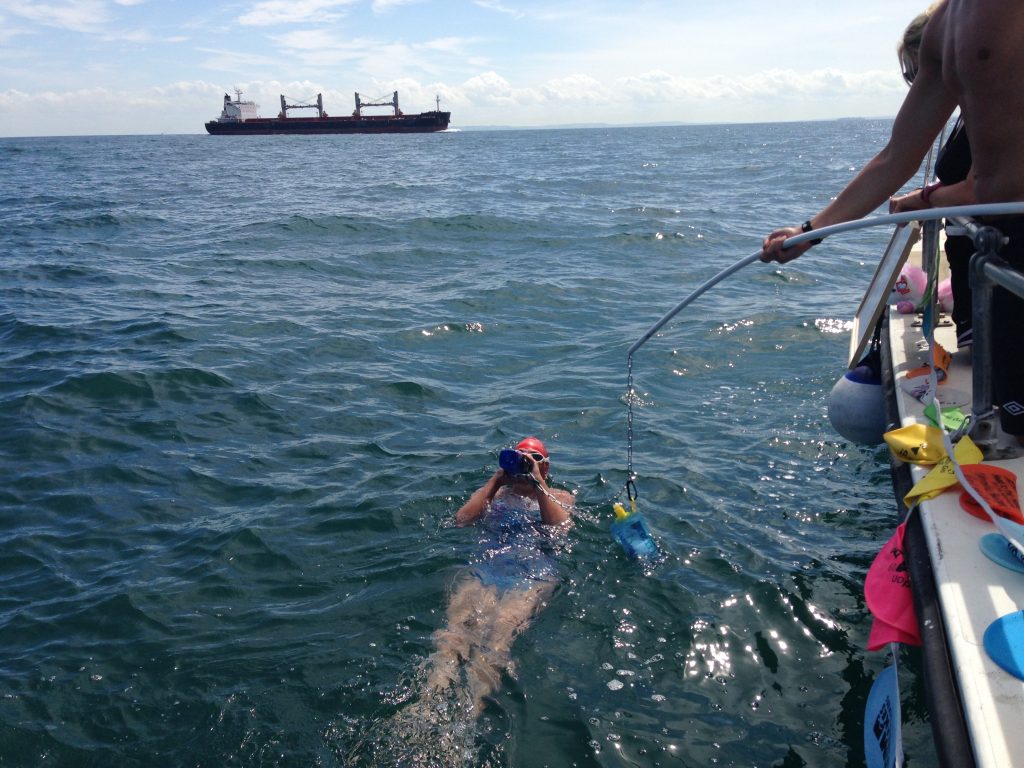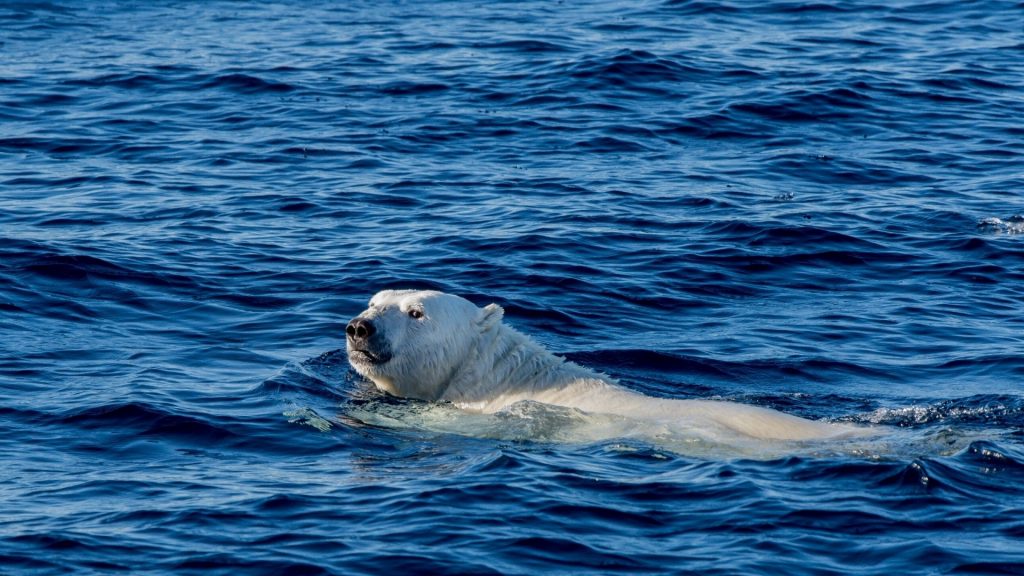The dreaded but sacred six hours
The alarm is set for the early hours and I’ve left a small plastic storage box at my bedroom door containing simple swimming gear and drinks. I pack it up the night before, not because it takes much time, but because psychologically having it ready means I am one step nearer overcoming my mind’s hesitation in carrying out the plan. It’s still deliberately vague on the mental level but on some other level it’s very definite.
I don’t want to admit to myself that it’s happening the next morning. Keeping it in the imaginary world feels like there is still an exit strategy and the possibility of a reprieve. At this stage if someone asked me how long I was planning to swim, then I would just tell them an hour or so and that perhaps I might make it a longer swim depending on weather conditions. The announcement of the planned time would make it too tangible, bringing it into reality too quickly. It would force me into a part of the mind that I’m quietly trying to avoid.
This sort of mental deception and play will continue throughout the next morning as I attempt to do a six hour swim in the cold sea. It’s an official requirement for registering for a channel swim as well as being the bare minimum and a starting point for being ready for the swim. Seven or eight hours is better and then ideally you swim the same length of time the following day. That amounts to twelve or thirteen hours of sea swimming over two days which starts to mirror a channel swim and helps prepare the mind. That double swim should then be repeated on subsequent weekends.

It’s one thing to do a long swim in a warm pool but when you have to do it in the chilly sea on a grey day with waves, wind, the fear of what’s lurking in the depths beneath you and only yourself for company, it’s a whole different ballgame. For my mind it is quite simply impossible, despite the fact that I’ve done these training swims countless times. The very thought fills me with fear and trepidation. The time element of the six hours is full of negative connotations; it’s clinical, mechanistic, gloomy and above all feels totally out of one’s control. Yet on another level, I know that if I follow the right steps, not only is it possible but much of it can be tremendously enjoyable.
All I think about to start with is getting myself down to the beach (seven minutes walk away) and as I leave I make a mental note of the time, which is my personal ‘official’ start of the six hours. I’m making a strong effort not to think any further ahead and already enjoying a tiny feeling of relief as I know the clock is ticking away and I’m not even in the sea yet. The next step is to get slowly into the water, starting with the feeling of the cool, wet sand under the toes and breathing the fresh air, until I find myself totally immersed. I’m in no rush to start ploughing up and down the bay, as I know that the longer the clock is left ticking away, the more the frightening six hours is being reduced. In my mind I’m already thinking that twenty minutes or more have elapsed and that I’m more or less through the first half hour.

To shift focus to the actual time spent in the water as measured by an independent observer would be demoralising as it might only be a few minutes. The mind might even say that since I hadn’t started swimming yet, it was zero! To enter into those thought patterns would trigger feelings of cold, boredom and a host of unwanted negative emotions. I have to make a concerted effort to stop the mind from venturing into that territory. Even the prospect of another fifteen minutes would become daunting, whilst six hours would be tantamount to a sentence of execution. At the same time I know that if I can swim for an hour and then somehow get through the second hour, then the iron gate will be almost smashed open. I just have to put my mental fear on hold and cling to the memory of what I have done countless times in training before. It’s just that, like Sisyphus, you feel that you are always back at the foot of the mountain, and you are facing this for the first time.
The third hour tends to go by quite quickly and I can usually tough it out for another half an hour or so before my mind starts demanding answers. At this stage I’m past half way. The second part invariably goes by quite quickly and is almost always accompanied by a sense of joy and euphoria.
So one part of my mind knows precisely what time I started. I think it may be that part of the mind that wakes up one second before the alarm. It’s also the part of the mind that will know towards the end, to within minutes, when six hours has actually elapsed. But I’ll make every effort not to look at the real watch time.
It takes me say seven minutes to get to the beach and about seven minutes to get completely ready. I might spend another five minutes slowly immersing myself before I start swimming. From that point on I try to distract myself and leave the man-made, mechanistic time ticking away in the background. I have a loop that I know takes about an hour to complete and also that I can stop for a breather at each end and fritter away another five to ten minutes. The official time that I’ve been in the water at this stage (timed by someone with a stopwatch, say,) would only be just over an hour, but with my head start (starting the timer leaving the house) and messing about, in my more subjective world I’m well on the way to the big two hour watershed. In fact I can just repeat that loop again and put all my focus only on that and I know that at least two hours is in the bag. Then follows a certain satisfaction and new energy from the relief of having taken a major first step. This is absolutely key as somehow you’ve managed to persuade yourself you’ve done much more than you actually have. It’s from this slightly false premise that you are then able to continue and finish the training session.
Still not allowing my mind to think of the big picture and not looking at the watch, I now focus only on repeating what I’ve just done without thinking about the bigger picture. All the time I’m saying to myself that I can also stop, but why not just try and complete this second loop. I think it’s always good to allow yourself exit strategies. Even before the six hours I would be telling my mind that I was just going in for an hour and could stop after that or perhaps continue for a little if everything felt fine.

Once I’ve repeated that loop, I’m well into the fifth hour. At that stage the relief and exhilaration will always easily take you through to the end. Of course then there is some very important squaring up to do as I effectively cheated the first fifteen minutes. So when you finally look at the watch towards the end, and surprisingly your subjective time will be very close to the clock time, it’s just a question of doing another fifteen minutes. Those fifteen minutes at the end are joyful ones as you are basically celebrating, whereas at the beginning they would be some of the worst.
I think what appears to be happening is that we are using our will power to silence that part of the mind which works with dull, lifeless, joyless time and instead we are putting our energy into subjective time. We can shift from the outer ticking clock, over which we have no control, to something inside ourselves over which we do have some control. There is much that can be said about this other time and what it connects you with, but I’m sure it links with left and right brain processes and I would like to think that it is where we are more connected to art, poetry, and imagination. As a keen student of meditation, it’s only through slowly learning how to quieten the restless mind that I’ve been able to start putting aside the uninspiring thoughts and nurture the stillness that can help me get through these training sessions and events.
It’s also for me in a sense a fictional world, not in the sense of being untrue, but rather one where I have a greater say in creating the reality. It’s important to try and stamp your own individuality and creativity on these frightening distances and periods of time. It can also be tiny things that help. Even starting the subjective clock as you walk down the beach and before your toes actually touch the water might give you an extra five minutes or so. Like a tiny ray of hope, those precious minutes can be enough to throw off the cut and dried mental calculations of the time elapsed. In fact so powerful can this strategy be that I’ve often found that in my subjective world, before even half an hour has elapsed, I’ve thought myself through the training session and feel that it’s almost over.

Of course the planning mind jumps in telling you just how absurd that is and the optimistic part of you has to keep quiet for a while, but it seems on some level you’ve done it. Looking back, that’s a very interesting crossroads to be at since one part of you has basically conquered it and the other part has decided that it’s impossible. There is an important decision to be made. I’ve come across this many times in running multi-day races where you seem to end up with a simple choice; either you just surrender to what is basically impossible or you just keep happy and cheerful knowing that it’s then very doable.
Something to note, again in line with trying to divide this up into easily manageable elements, is that whenever you can make life easier for yourself in these gruelling situations, then you must do it. The aim of these six hour swims is to be in the water for that amount of time, without worrying unduly about the distance covered. To start with it’s best to keep that for the pool or somewhere easier. Later once you have the confidence to do these longer swims repeatedly, then you can focus more on keeping up the pace, which of course eventually will be an important factor.

Curiously enough, the physical side of these long swims is never nearly as significant as you would expect. Of course one is a bit cold for the first few minutes and sometimes the second hour as you adapt, but after that it’s more of a discomfort than a major factor. Rather then being a physical challenge with some kind of vague mental element, the whole thing seems to be predominantly a mental challenge with a slight physical sting in the tail. The days and the night before though it’s slightly terrifying and sometimes the only remedy is just to go out and get it done. I remember during training for channel swims, when I imagined what I would have to go through on the day, the thing that almost put me off doing it entirely was the prospect of having to deal with the evening and night before the swim. I suppose the mind is operating very powerfully at that time as you are not in the water yet and there is this great gulf between you and the water. Once you start swimming you seem to merge more with everything and slowly that gloomy analytical part of the mind switches off.
.
“The English Channel frightens the human body.
The English Channel challenges the human vital.
The Engish Channel puzzles the human mind.
The English Channel invites the human heart.
The English Channel treasures the human soul.”Sri Chinmoy (from talk given after two of his students first swam the channel in Sept 1985)
